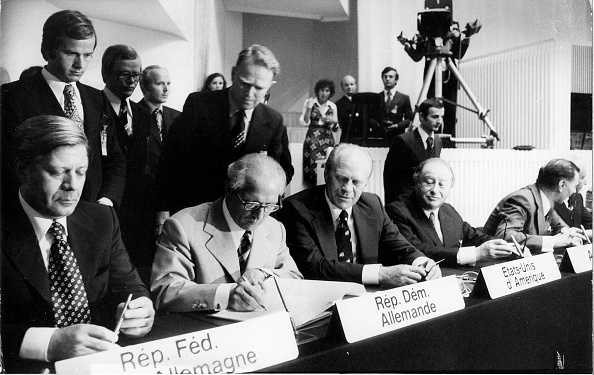For some 5 months — between October 4, 1977, and March 9, 1978 — delegates of the 35 nations that signed the 1975 Helsinki accord met in Belgrade to determine how well the commitments set out in the Final Act of the Conference on Security and Cooperation in Europe had been kept. From their work, a new ingredient in East-West diplomacy emerged: The recognition of human rights as an integral aspect of detente. This is an important step on the road toward making Europe a place where human rights are universally respected in all countries, even though it carries no guarantees of speedy remedies for existing abuses.
Although the Belgrade meeting examined new proposals, drafted a concluding document and scheduled the next review meeting, the main work of the Belgrade meeting was a line-by-line review of the Final Act. This complex document contained provisions for regulating the political relations between the states of Europe, for easing military tensions among them, and for improving trade, commerce and the flow of people and ideas between East and West. But the elements that caught the imaginations and enthusiasm of ordinary citizens were those guaranteeing human rights and fundamental freedoms and promoting policies among governments which would enhance their consistent observance.
To understand the advance made at Belgrade and the limits on it, it is necessary to remember that CSCE decisions of the 35 countries can only be arrived at unanimously; each nation can reject any proposal or document by merely denying consensus. Moreover, the discussions at Belgrade were closed to the public and not transcribed, except for 2 weeks of formal, on-the-record speeches at the start and end of the meeting. Given these circumstances, Belgrade was more what therapists would call an “encounter session” than what jurists would regard as a tribunal. It was better suited for exchanges of views and arguments than for the issuance of formal findings or decrees.
The United States and its allies-along with many of the neutral and nonalined countries-sought to make the review of Final Act implementation the touchstone of the Belgrade meeting. For the United States, the most urgent and important matters centered on questions of human rights, for it was here that performance was most glaringly deficient. The working sessions at Belgrade demonstrated the determination of Western and neutral signatories to record specific criticisms of Eastern implementation of the Helsinki Final Act.






